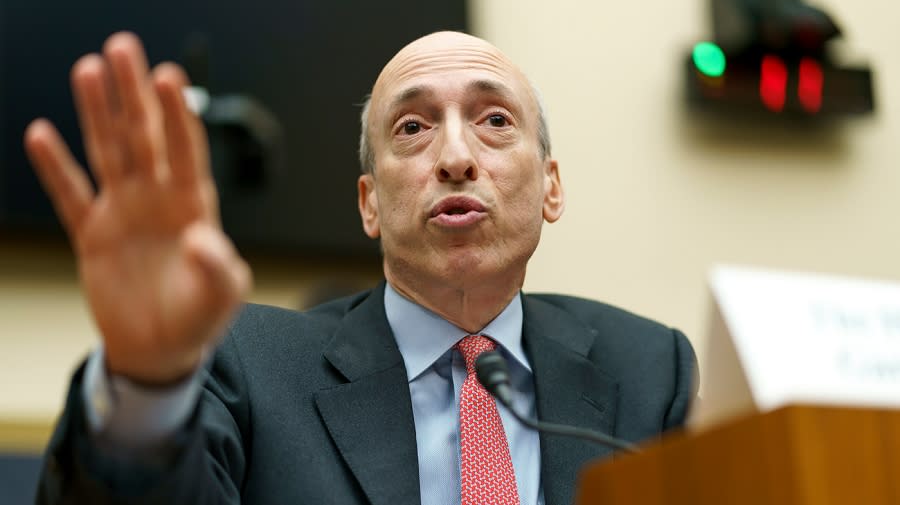House passes bill outlining new framework for crypto regulation despite SEC pushback

The House passed legislation Wednesday laying out a new framework for when cryptocurrencies should be regulated by the Securities and Exchange Commission (SEC) or the Commodity Futures Trading Commission (CFTC).
The lower chamber voted 279-136 to pass the Financial Innovation and Technology for the 21st Century Act (FIT 21), despite opposition from SEC Chair Gary Gensler. Seventy-one Democrats joined 208 Republicans to support the measure.
FIT 21 would classify digital assets, like crypto, as commodities regulated by the CFTC if the blockchain on which they run is “functional and decentralized.”
If their blockchain is “functional but not decentralized,” they would be considered securities and fall under the purview of the SEC.
Gensler argued in a statement Wednesday that the legislation would “create new regulatory gaps and undermine decades of precedent regarding the oversight of investment contracts.”
“The crypto industry’s record of failures, frauds, and bankruptcies is not because we don’t have rules or because the rules are unclear,” the SEC chair said ahead of the House vote. “It’s because many players in the crypto industry don’t play by the rules.”
“We should make the policy choice to protect the investing public over facilitating business models of noncompliant firms,” he added.
Gensler noted that FIT 21 would abandon the Supreme Court’s long-standing test for classifying securities and would allow issuers to self-certify that their products are decentralized, making them digital commodities and removing them from SEC oversight.
This would allow much of the crypto industry to operate under “a light touch regulatory regime” with the CFTC, Rep. Maxine Waters (D-Calif.), ranking member of the House Financial Services Committee, argued on the House floor Wednesday.
“This is a bill where the crypto companies decided they didn’t like the SEC, they did not want to be regulated, and they were going to come to the Congress of the United States, and they were going to use their power and they were going to use their employees to change the rules of the game,” Waters said.
Gensler is an unpopular figure in the industry due to his frequent enforcement actions against crypto companies and his hesitation to approve new crypto-based assets.
The SEC ultimately approved several exchange-traded funds (ETFs) holding bitcoin in January, but only after a federal court found that the agency improperly rejected an application for a spot bitcoin ETF
Rep. French Hill (R-Ark.), who testified before the House Rules Committee in favor of the legislation Tuesday, contended that it “does not create a ‘light-touch’ regime for crypto crooks or prevent the SEC from being able to police its markets.”
“This bill does not create securities loopholes. This bill does not deregulate crypto,” the chair of the House Financial Services Subcommittee on Digital Assets, Financial Technology and Inclusion said.
Instead, House Financial Services Chair Patrick McHenry (R-N.C.) argued Wednesday that the bill helps resolve confusion under the current regulatory framework, in which the SEC and CFTC are “in a food fight for control of these asset classes.”
“FIT 21 fixes this by creating a regulatory framework that will provide clear rules of the road and strong guardrails for the American engaging with the digital asset ecosystem,” McHenry said on the House floor.
While the White House said in a statement Wednesday that it opposes FIT 21 over a lack of “sufficient protections for consumers and investors,” it did not expressly threaten to veto the legislation.
“The Administration is eager to work with Congress to ensure a comprehensive and balanced regulatory framework for digital assets, building on existing authorities, which will promote the responsible development of digital assets and payment innovation and help reinforce United States leadership in the global financial system,” it said.
Sheila Warren, CEO of the Crypto Council for Innovation, called Wednesday’s vote a “defining moment for the crypto industry.”
“The permafrost is thawing and there is a feeling of positive momentum throughout DC,” Warren said in a statement.
Blockchain Association CEO Kristin Smith emphasized the bipartisan nature of the vote.
“This bipartisan vote signals that lawmakers on both sides of the aisle recognize the immense potential of blockchain technology and digital assets, while also acknowledging the need for regulatory guidelines to enable responsible innovation and prioritize consumer safeguards,” Smith said.
Updated at 6:12 p.m. EDT.
Copyright 2024 Nexstar Media, Inc. All rights reserved. This material may not be published, broadcast, rewritten, or redistributed.
For the latest news, weather, sports, and streaming video, head to The Hill.

 Yahoo Finance
Yahoo Finance 